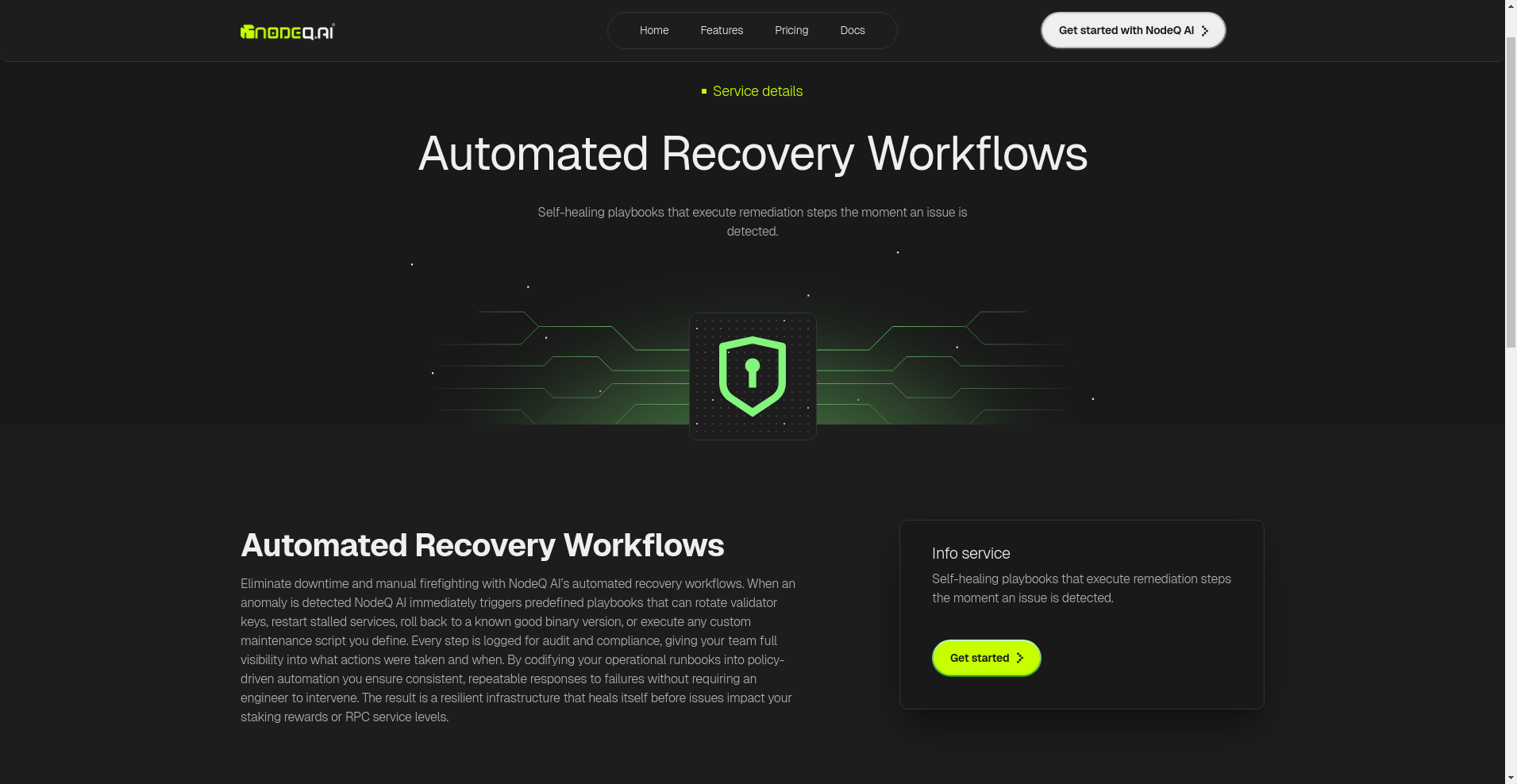NodeQ AI ($NQAI) Review: A Data-Driven Look at Its Legitimacy and Risks

What Is NodeQ AI: An Introduction
NodeQ AI is an advanced platform focused on blockchain node management, powered by artificial intelligence (AI) to simplify, secure, and optimize validator and node operations across multiple blockchain networks. The project aims to provide an all-in-one control plane that enables operators to deploy, monitor, and automate complex node infrastructure with minimal manual effort, leveraging automation, telemetry, and predictive insights.
Based on the available data, the platform emphasizes features such as rapid, Infrastructure-as-Code (IaC) deployment, multi-chain telemetry aggregation, autonomous risk forecasting, and self-healing workflows. Its ultimate goal appears to be increasing node uptime, safeguarding staking rewards, and reducing operational complexity—a crucial need for professional validators and enterprise operators.

The Team and Vision Behind NodeQ AI
The specific team members behind NodeQ AI are not detailed in the provided data. There is no publicly available information about founders, advisors, or previous experience, which poses questions about transparency and credibility. The absence of clear leadership backgrounds can be a concern for investors and users seeking trustworthiness from a technically sophisticated platform.
From the roadmap and feature set, the project appears to be targeting large-scale validators and enterprise clients, promising features such as rapid deployment, automated risk mitigation, and cross-chain telemetry. However, without verifiable team credentials or prior successful projects, assessing their capacity to deliver remains challenging.
- Support for multi-chain telemetry (Ethereum, Cosmos, Polkadot, Solana, etc.)
- Automated node deployment and self-healing workflows
- Multi-tiered pricing plans—Free, Professional, and Custom Enterprise options
- Token utility for discounts and governance ($NQAI)
Overall, the project's roadmap and feature promises are ambitious but uncorroborated by transparent leadership information. This warrants a neutral stance on whether they can fully execute their plans.

Assessing the Security and Integrity of NodeQ AI
Based solely on the Cyberscope audit report available, the security analysis provides limited insight but notable points. The audit was focused on the token contract associated with NodeQ AI, and the assessment has a high criticality level, which warrants careful review.
- Security Score: 88 out of 100, indicating a generally strong security posture.
- Audit Findings: Only one major high-criticality issue was reported, details of which are not publicly specified but suggest the need for further audits.
- Trust factors such as KYC, third-party audits, or bug bounty programs are not evident from the data, which raises questions about ongoing vulnerability management.
- Additional technical details, such as code audits of core infrastructure or smart contracts, are not publicly available, making it difficult to evaluate overall security rigor.
Implementation of routine third-party audits and transparent vulnerability disclosures would be necessary to strengthen trust. As it currently stands, the high audit security score is promising but insufficient to deem the platform as fully audited or battle-tested for enterprise-grade security.

A Breakdown of NodeQ AI Tokenomics
The token, <$NQAI>, plays a supportive role in NodeQ AI’s ecosystem, primarily providing discounts on subscriptions and serving governance functions. Its economic model appears designed to incentivize network participation and utility token holding.
- Total Supply: 1 billion tokens.
- Utility: Used to access platform features; up to 20% discounts when paying with <$NQAI>.
- Distribution:
- 30% Public/Private Sale
- 20% Team & Advisors (with vesting)
- 15% Ecosystem Development & Grants
- 10% Marketing & Partnerships
- 10% Foundation Reserve
- 15% Staking Rewards
- Economic Outlook: The reliance on discounts as the primary utility may limit the token’s perception as a governance or staking asset. With no reported staking or liquidity mechanisms, the token’s long-term value is uncertain and largely tied to platform adoption.
Analysis:
The tokenomics framework aligns with typical utility tokens in blockchain service platforms—they incentivize usage and ecosystem growth. However, absence of staking, vesting details, or locked-in liquidity provisions could pose risks such as inflationary pressures or speculative volatility. The utility's focus on discounts favors user adoption but may not generate inherent value appreciation without further utility or governance integration.
Assessing NodeQ AI's Development and Ecosystem Activity
Based on publicly available data, NodeQ AI’s development activity is limited but ongoing. The recent audit and active social media presence indicate a team engaged in technical and community outreach efforts. However, concrete adoption metrics, such as active nodes, users, or network integrations, are not disclosed.
The platform appears to be in the late development or early deployment phase, with plans for mainnet launch, ecosystem partnerships, and enterprise onboarding scheduled in 2024. The lack of measurable metrics makes it difficult to assess traction or real-world use cases at present.
Potential users should consider that the platform’s features are highly technical and tailored toward professional node operators, which inherently limits immediate mass adoption but aligns with enterprise needs.
Reviewing the Terms and Conditions
There is no explicit mention of legal terms, user agreements, or compliance clauses within the provided data. Without access to detailed legal documentation, questions about user rights, data privacy, or specific terms of service remain open. An overly vague or unpublicized legal framework could introduce risks, especially for enterprise clients concerned with regulatory compliance and liabilities.
Investors and users should insist on transparent legal documentation before engaging financially or operationally with the platform.
Final Analysis: The Investment Case for NodeQ AI
NodeQ AI presents itself as a cutting-edge, AI-driven platform aimed at professional blockchain infrastructure management. Its focus on automation, multi-chain telemetry, and predictive risk management positions it favorably within the growing Web3 ecosystem. The security audit score is promising but insufficient without further third-party validation. The tokenomics reflects typical utility models, but the lack of staking and broader governance features limits its intrinsic value growth potential.
However, the absence of public team credentials, detailed legal assurances, and actual adoption metrics introduces significant risks, especially for institutional and enterprise users contemplating early engagement. The project’s success hinges on transparent execution, leveraging robust security audits, and demonstrating real-world deployment at scale.
- Pros / Strengths:
- Innovative AI-driven automation and predictive analytics
- Multi-chain telemetry and monitoring capabilities
- Tiered subscription plans catering to different user needs
- Strong security score in the audit, with AES-256 encryption
- Focus on enterprise features like compliance and SLA guarantees
- Cons / Risks:
- Lack of public team member backgrounds, raising transparency concerns
- Limited third-party security audits beyond the initial token contract
- Uncertain actual user adoption and on-chain activity metrics
- No detailed legal or compliance documentation publicly available
- Platform complexity might limit onboarding to only experienced users or enterprises
Considering the above, anyone interested in NodeQ AI should carefully evaluate the project’s transparency, security, and real-world traction before considering it a viable investment or operational platform. Its innovative features are promising, but due diligence is essential to mitigate inherent risks.

Olivia Lewis
Sociotechnical Systems Analyst
I analyze the intersection of social networks and blockchain systems. I use data to expose how scammers manipulate communities with bots, FUD, and engineered hype.
Similar Projects
-
UMA
UMA ($UMA) Review: A Deep Dive into Its Tech & Risks
-
Mintdash
Mintdash Review: Is This Crypto Project a Scam? Crypto Scam Checker & Project Review
-
Blesscent Meta Coin
Blesscent Meta Coin Review | Crypto Scam Checker & Project Scam Review
-
Taolie.ai
Review of Taolie.ai - Crypto Scam Checker & Project Analysis
-
Hopey
Hopey ($HOPE) Review: Assessment of Security & Future Risks